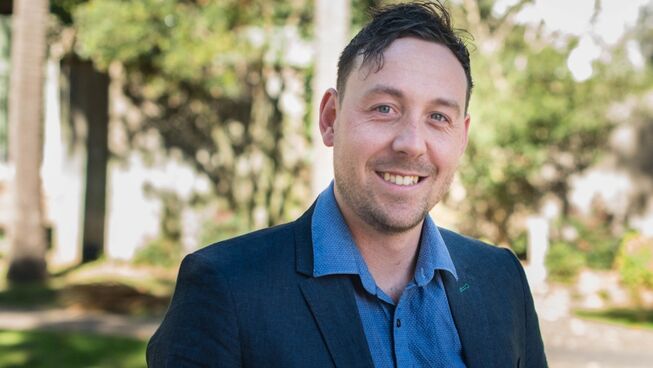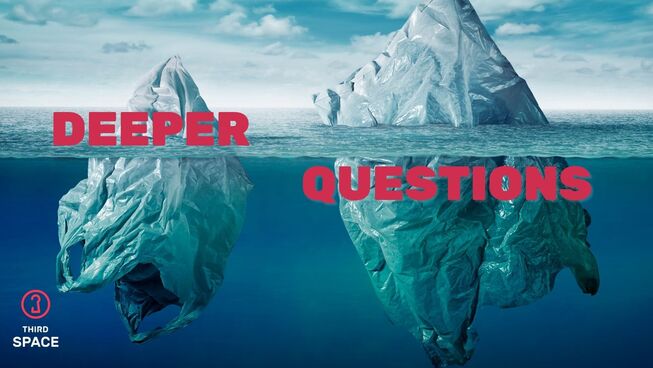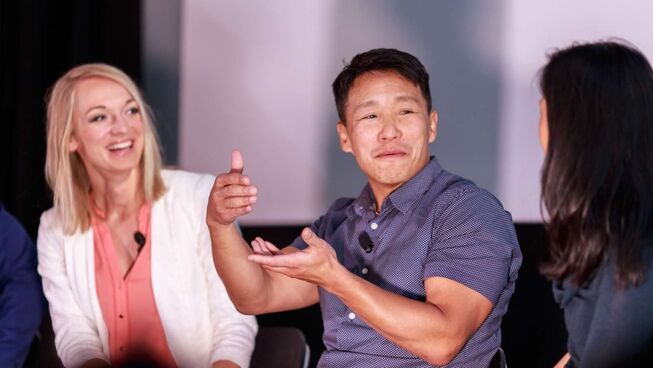Driving Under the Influencer

One of my favourite tv shows over the last few years was the short lived UK series Fleabag. It was an irreverent yet beautiful story of a young woman (played masterfully by Phoebe Waller-Bridge) who has been crushed by the loss of her best friend, and spends her lonely days spiralling in and out of self-destructive behaviour. She’s quick witted, impulsive, charismatic, and confident. Yet deeply fragile, on edge, never too far from estrangement and always up for that one-drink-too-many.
After a while, a Catholic priest (played by Andrew Scott) moves into her neighbourhood, and she quickly builds an intoxicating connection, despite her atheistic sarcasm and taunting. The priest gives as good as he gets, and seeks to walk with her through her personal pandemonium. The problem is that his life is in an equal state of disorder and chaos, behind the gloss and mystique of the priestly garments.
One night after a few drinks Fleabag is coaxed into the confessional booth. After some delightful (and wildly inappropriate) back and forth, she embraces the moment and is engulfed in a hair-raising combination of existential vulnerability, clarity and madness. She pours out her doubts, fears and wounds in exchange for help and guidance.
“I’m frightened.”
“About what?”
“Forgetting things. People. Forgetting people. And I’m ashamed of not knowing what I...”
“What you want? It’s okay not to know what you want.”
“No, I know what I want. I know exactly what I want. Right now.”
“What’s that?”
“It’s bad.”
“It’s okay.”
“I want someone to tell me what to wear in the morning.”
*Priest laughs* “Okay, well, I think there are people who can…”
“No, I want someone to tell me what to wear every morning. I want someone to tell me what to eat. What to like. What to hate. What to rage about. What to listen to. What band to like. What to buy tickets for. What to joke about. What not to joke about. I want someone to tell me what to believe in. Who to vote for and who to love and how to...tell them. I just think I want someone to tell me how to live my life, Father, because so far, I think I’ve been getting it wrong. And I know that’s why people want someone like you in their lives, because you just tell them how to do it.”
“You just tell them what to do and what they’ll get out of the end of it, even though I don’t believe your bull**** and I know that scientifically nothing that I do makes any difference in the end, anyway, I’m still scared. Why am I still scared? So just tell me what to do. Just ****ing tell me what to do, Father.”
Lately, this tingly and revealing scene has made me think of the modern day ‘influencer’. Part of the reason they have become such a feature of online social media culture, is that deep down we want to have someone make life simple for us. We want to be guided, we want others to let us know the water’s fine before we dip our toes in, we want to find trusted voices that we can relate to and emulate. We want to be influenced and shielded from the uncomfortable burden of choice.
And yet, we also don’t want to be influenced by traditional means.
What Do They Know?
In his timely book The Death of Expertise (2017), Tom Nichols details the breakdown of trust and public migration away from institutions and experts. While there’s always been debate around science, journalism, public policy, academic research, etc… there’s an ever growing slice of the public who are sceptical of what the traditional custodians of knowledge are offering.
Part of it is about what it means to be an expert today, with micro-specialisation producing a certain inaccessible class of technocrat who at times struggle to summarise their painstaking research into easily digestible information nuggets. Not only does truth have to sound right, it also has to feel right in our age of authenticity.
But the larger issue remains the Internet’s ability to obfuscate, decentralise and ‘make us all dumber’ by creating the illusion of unlimited knowledge without the middlemen and gatekeepers. In a matter of minutes we can become an ‘expert’ on anything with no formal training. We can also be unduly influenced by what feels novel, grassroots, and sensible to us.
Which is where the influencer comes in.
In a world where anyone can become an overnight sensation with a well-timed video, blog post, or podcast series that hits a nerve and generates followers, it’s the influencer that has stepped into the hybrid vacuum of quasi-expert/celebrity/lifestyle coach.
It becomes its own form of expertise, with its own culture and students. The influencer’s personal touch, story and interaction become far deeper connection points than methodology, data and academic rigour.
Behind the Superficial
While this non-traditional pathway sounds like a massive shortcut (and in some ways it absolutely is), that doesn’t mean it comes easy.
At first glance, many of us probably think of influencers as talking mannequins pushing pyramid scheme products, but there’s an interesting dynamic at play. Derek Thompson, a staff writer for The Atlantic, spent some time interviewing and thinking about the role of influencers in society. While often mocked, there is an entrepreneurial spirit and independence that we all crave, which is part of the allure. But it’s also damn hard work, with relatively few making a career out of it.
Not only do influencers have to curate an image and narrative that tells a compelling story. But you also have to combine being tech savvy, charismatic, relentlessly on brand, and always feeding the insatiable hunger of the social media beast with posts, videos, chat rooms, and photos. Added to that you have to be interactive, relatable and authentic in a brutally competitive industry. It sounds exhausting just thinking about it.
But when attention is the premium currency, and staying relevant means staying on people’s screens – turning clicks into subscribers into consumers into advocates, is not an unreasonable ask in a digital marketplace obsessed with follower counts, sharable content, and advertising real estate. Besides, we all want to get noticed, and our workplaces depend on it to survive.
We’re All Playing the Same Game
Who of us doesn’t want to be the master of our domain, and be seen as successful in our respective industry? We all want to be people of influence in some way. Whether it’s having the bosses ear, making that media appearance, giving that workshop, or persuading a doubter to try your shoes on for size. Most of us believe in the things that we’re passionate about, and want others to see what we see through our careers, and extra-curricular pursuits.
But we’re also pre-disposed to being influenced. We all have our subjective tastes, collections and styles with our latest toys or luxuries effortlessly within reach. We all have our favourite voices and characters that we let in to our lives through the squeaky Internet roller-door. A cacophony of voices to whisper in our ears, live in our minds, and direct our steps as we follow their path. We’re all in the business of allowing ourselves to be influenced.
Thus, the influencer has become a fascinating case study into the collective psyche of our ever malleable society. While many are viewed with deep suspicion, they are paradoxically also the archetypal symbol of authenticity and what it means to be human.
There’s something attractive about letting other people into the mess of our lives. Revealing the struggles, the conflicts, the doubts, the weaknesses and the triumphs. Being the novice who slowly puts the mess of life back into the toy boxes and cupboards, and lets others know they can do it too. These seem to be the things that win trust, loyalty and a growing audience. And funnily enough, this has been a characteristic and marker of Christianity for two millennia now as it spans the globe and influences countless lives.
The Authentic Deity
One of the enduring and ever perplexing claims of Christianity is that God literally became a man and walked on earth (and water, but that’s another conversation for another time). Jesus understood like no other that we are all vulnerable fleabags who don’t have our s**t together and need help. While Jesus was the fiercest advocate for truth you’d ever meet, he also saw through the faux-experts of his day when he dressed down the religious experts who seemingly had it all together, yet were desperately out of touch with the people and reality.
He calls us to follow him, where we’ll find truth, but also the life we’re looking for. That doesn’t mean it’ll come easy, it involves confession, sacrifice, and devotion, but in it we will find life in abundance.
The apostle Paul succinctly summarises the call, into a delightfully peaty dram with an everlasting finish that stays on the lips, yet warms the soul and mind.
“Therefore, I urge you, brothers and sisters, in view of God’s mercy, to offer your bodies as a living sacrifice, holy and pleasing to God—this is your true and proper worship. 2 Do not conform to the pattern of this world, but be transformed by the renewing of your mind. Then you will be able to test and approve what God’s will is—his good, pleasing and perfect will." (Romans 12: 1-2)
All of us at some point will be frightened, unsure of what we want, and overcome with worry that we’ve been getting it wrong the whole time. But God offers all of us a priestly figure in Jesus, who walks with us through the pandemonium, is remarkably accessible, and a bulwark of truth and life.
As the creator of the universe and all of life, he knows what the good life looks like. It’s there for the taking if only we’ll give ourselves first: Our attention, our worries, our minds, our wounds, our lives, and our authentic selves.
If you'd like to continue the conversation then register for our next edition of The Edge: Real Influencers? on Thursday the 19th May.






